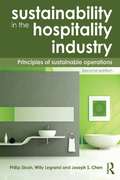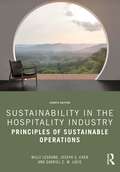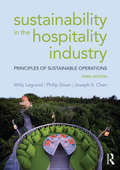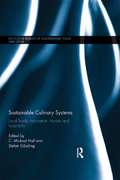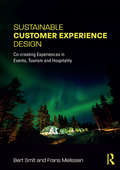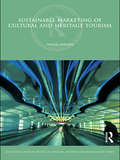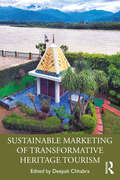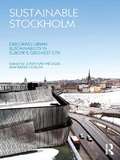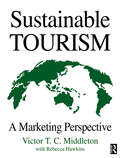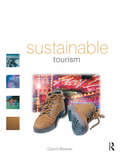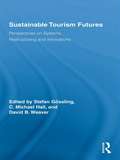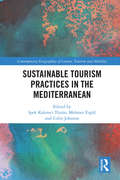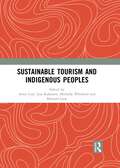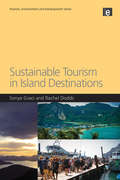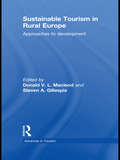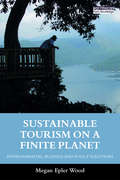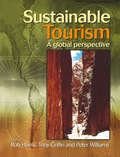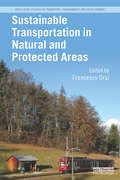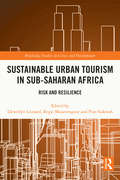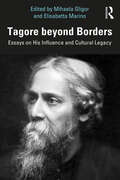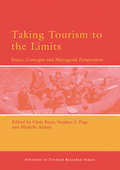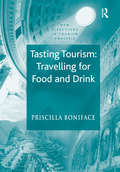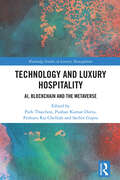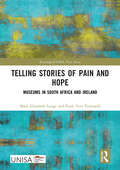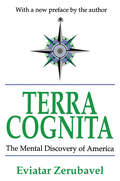- Table View
- List View
Sustainability in the Hospitality Industry 2nd Ed: Principles of Sustainable Operations
by Philip Sloan Joseph S. Chen Willy LegrandSustainability is one of the single most important global issues facing the world. A clear understanding of the issues surrounding climate change, global warming, air and water pollution, ozone depletion, deforestation, the loss of biodiversity and global poverty is essential for every future manager in the hospitality industry. Present and future hospitality executives need to know how sustainable management systems can be integrated into their businesses while maintaining and hopefully improving the bottom line. Sustainability in the Hospitality Industry, second edition, is the only book available to introduce the students to economic, environmental and social sustainable issues specifically facing the industry as well as exploring ideas, solutions, and strategies of how to manage operations in a sustainable way. Since the first edition of this book there have been many important developments in this field and this second edition has been updated in the following ways: updated content to reflect recent issues and trends including hotel energy solutions and green hotel design two new chapters on 'Sustainable Food' and 'Social Entrepreneurship and Social Value' updated international case studies throughout to explore key issues and show real life operational responses to sustainability within the hospitality industry. New case studies on growth hotel development markets, Asia and the Middle East new practical exercises throughout to apply your knowledge to real-life sustainability scenarios. This accessible and comprehensive account of Sustainability in the Hospitality Industry is essential reading for all students and future managers.
Sustainability in the Hospitality Industry: Principles of Sustainable Operations
by Joseph S. Chen Willy Legrand Gabriel C. LaeisThis foundational textbook investigates the economic, environmental and social sustainability issues facing the hospitality industry today, and explores ideas, solutions and strategies of how to manage operations in a sustainable way. This updated fourth edition features new content including: Research on nature-based solutions and zero-carbon approaches in facilities, technologies for energy, water and waste management, changes in consumer behaviour, and environmental and social impacts of food production A new chapter on employees, diversity, inclusion and well-being in the industry A new chapter on the challenges of operating in the Global South More than 100 international industry case studies and focused info boxes New practical exercises, discussion questions and research project ideas based on real-life sustainability scenarios Accessible and comprehensive, this book is essential reading for all students as well as current and future managers in the hospitality industry.
Sustainability in the Hospitality Industry: Principles of sustainable operations
by Philip Sloan Joseph S. Chen Willy LegrandSustainability in the Hospitality Industry, Third Edition, is the only book available to introduce students to economic, environmental and socially sustainable issues specifically facing the industry as well as exploring ideas, solutions and strategies of how to manage operations in a sustainable way. Since the second edition of this book, there have been many important developments in this field and this latest edition has been updated in the following ways: Updated content including sustainable food systems, hotel energy solutions, impacts of technology, water and food waste management, green hotel design, certification and ecolabelling systems and the evolving nature of corporate social responsibility strategies. New chapters exploring environmental accounting and the internalization of externalities as well as the management of accessibility in hospitality. Updated and new international case studies with reflective questions throughout to explore key issues and show real-life operational responses to sustainability within the hospitality industry. This accessible and comprehensive account of Sustainability in the Hospitality Industry is essential reading for all students and future managers in the hospitality industry.
Sustainable Culinary Systems: Local Foods, Innovation, Tourism and Hospitality (Routledge Studies of Gastronomy, Food and Drink)
by Michael Hall Stefan GösslingThere is increasing public and academic interest in local and sustainable foods and food tourism. These interests have been reflected in such diverse elements as the growth of farmers markets, green restaurants, food miles, crabon and sustainability labelling, concerns over food supply and security, Slow Food, Fair Trade, and a desire to buy and 'eat locally'. Food related hospitality and tourism is integral to this process because of the way in which it simultaneously acts to globalise and localise food consumption and create new foodways and commodity chains. This book therefore aims to provide an integrated understanding of the contemporary interest in food and food tourism through the use of an international collection of illustrative case study chapters as well as the provision of a novel integrative framework for the book, a sustainable culinary system. This is the first volume to examine the concept of sustainable culinary systems, particularly with specific reference to tourism and hospitality. Divided into two parts, firstly the notion of the local is explored, reflecting the increased interest in the championing of local food production and consumption. Secondly treatment of sustainability in food and food tourism and hospitality in settings that reach beyond the local in a business and socio-economic sense is reviewed. The book therefore, reflects much of the contemporary public interest in the conscious or ethical consumption and production food, as well as revealing the inherent tensions between local and broader goals in both defining and achieving sustainable culinary systems and the environmental, social and economic implications of food production and consumption. This book provides the reader with an integrated approach to understanding the subject of how culinary systems may be made more sustainable and will be valuable reading to all those interested in sustainable food and food tourism.
Sustainable Customer Experience Design: Co-creating Experiences in Events, Tourism and Hospitality
by Bert Smit Frans MelissenExperiences are an important part of our lives and increasingly represent a crucial topic to address for businesses and professionals. This book focuses on designing, staging and managing experiences within the context of the events, tourism and hospitality industries. It also illustrates current and future developments in these industries and wider society, with an emphasis on sustainable development. The book offers an innovative approach for successfully creating experiences for (potential) customers that is based on combining insights and methods from the world of design and the social sciences. Moreover, it shows how the experience economy and sustainable development both reinforce one another and create challenges that businesses and professionals can address through this approach. Critical thinking questions, practical examples and international case studies are integrated throughout the text. Combining a design science and a social sciences perspective in one inclusive hands-on approach to designing, staging and managing experiences, this is essential reading for all students of Events, Tourism and Hospitality Management, but also related fields.
Sustainable Marketing of Cultural and Heritage Tourism (Routledge Critical Studies in Tourism, Business and Management)
by Deepak ChhabraCultural attractions play an important role in tourism at all levels, and attract huge numbers of tourists interested in heritage and the arts. Cultural Heritage Tourism has positive economic and social impacts but can also have negative impacts on communities and regions. This book draws together and links ideas of tourism from sustainable marketing perspectives and embeds it within a heritage management setting. Through a discussion and analysis of existing literature and practices this book aims to propose a marketing strategy framework grounded in sustainable principles that can be used to sustain and preserve the authenticity of cultural heritage for future generations, whilst appealing to the suppliers, the regulators, and the consumers. The book first explains the dynamics of cultural heritage with its authenticity underpinnings, marketing, and tourism, and proposes a strategic praxis drawn from core sustainable principles. This is followed by a pragmatic examination of the proposed framework from the shaper’s (provider’s) perspective. The material presented in this book is not merely an agglomeration of documented secondary research, but the theoretical concepts are grounded in empirical research and interactive discussions with students and the travel and tourism industry. A variety of heritage institutions across the globe are used as starting points to test the applicability of the proposed paradigm: these include museums, historic house museums, heritage hotels/resorts, festivals, and heritage merchandize. This is a timely offering to a growing and vibrant area of research; what is most pertinent is that it is a thorough and fresh take on the topic with primary research included. It will find a place in student materials for a variety of courses and it should be read by practicing academics and researchers.
Sustainable Marketing of Transformative Heritage Tourism
by Deepak ChhabraThis book proposes that sustainable marketing should be founded on a higher level of consciousness, governed by the Eastern ethical principles of dharma and karma. It suggests a socially responsible, integrated marketing strategy to boost transformational heritage tourism.The book puts forward a framework to promote and inspire transformative heritage tourism from a sustainable marketing perspective. Drawing on examples from different parts of the world such as Thailand, China, the USA, India, Australia, the United Kingdom, Spain, and Hong Kong, it takes a unique approach by integrating elements associated with distributive justice, procedural justice, morally motivated existentialist authentic experiences and the well-being of visited and visiting environments. The book pivots on the planning and marketing of heritage of communities such as local, descendent and indigenous across eight broad themes: (1) promotion and sustainable branding of heritage tourism; (2) empowerment of indigenous communities; (3) authenticity and conservation of heritage; (4) safeguarding of art, culture and cultural landscapes; (5) economic viability for the host communities; (6) interpretation and resolution of dissonant heritage representations; (7) stimulating audience engagement and co-created mindful spaces and; (8) facilitating moral consciousness and stimulating lasting inner transformation in guests and hosts. Scholars can replicate and/or test the proposed guided sustainable marketing model, referred to as the transformative heritage tourism pathway, which is adapted from a) the needs, activities and well-being sequential path of transformation and, b) the socially responsible sustainable marketing doctrine guided by the principles of 'dharma' and 'karma'. This book is unique as it stresses eudaimonia as the ultimate goal of well-being and argues that its pursuit can steer the sustained transformation route toward a higher sense of consciousness and responsible production and consumption of heritage resources.In summary, this book contributes toward advancing the dialogue on sustainable marketing and transformative heritage tourism. It will appeal to researchers, undergraduates and practitioners interested in sustainable marketing, transformative heritage tourism and social, ecological, cultural and economic welfare of visited and visiting destinations.
Sustainable Stockholm: Exploring Urban Sustainability in Europe’s Greenest City
by Jonathan Metzger Amy Rader OlssonSustainable Stockholm provides a historical overview of Stockholm’s environmental development, and also discusses a number of cross-disciplinary themes presenting the urban sustainability work behind Stockholm’s unique position, and importantly the question of how well Stockholm’s practices can be exported and transposed to other places and contexts. By using the case of Stockholm as the pivot of discussions, Sustainable Stockholm investigates the core issues of sustainable urban environmental development and planning, in all their entanglements. The book shows how intersecting fields such as urban planning and architecture, traffic planning, land-use regulation, building, waste management, regional development, water management, infrastructure engineering—together and in combination—have contributed to making Stockholm Europe’s "greenest" city.
Sustainable Tourism
by Rebecca Hawkins Victor T.C. MiddletonLooking ahead to the 21st century, Sustainable Tourism explains the current thinking process that underlies the emerging international principles of more sustainable development in travel and tourism. Using international illustrations it draws on experience and good practice as they are being increasingly applied around the world in the late 1990s. In sharp contrast to the problem analysis approach adopted by so many authors to this subject, this book is focused on the pro-active role the private sector industry can play in partnership with the public sector to achieve solutions through its day-to-day operations and marketing, expecially in product enhancement and quality controls.Case material, contributed by senior professionals in the industry, include:*Kruger National Park, South Africa *Quicksilver Connections, Barrier Reef, Australia *Edinburgh's Old Town, UK *Ironbridge Gorge Museum, UK *Rutland Water, UK.Industry illustrations are drawn from British Airways, Grecotel, Inter-Continental Hotels and Resorts, the International Federation of Tour Operators, P&O and TUI.Professor Victor Middleton has had some thirty years' international experience of marketing practice covering most of the private and public sectors of travel and tourism. He holds appointments as Visiting Professor at Oxford Brookes University and University of Central Lancashire.Dr Rebecca Hawkins runs her own business specialising in environmental aspects of tourism projects and has undertaken a number of pioneering programmes in this role. She was Deputy Director of the World Travel and Tourism Environment Research Centre at Oxford Brookes University, where she worked with Victor Middleton.
Sustainable Tourism
by David WeaverSustainable Tourism comprehensively examines the theoretical and applied dimensions of contemporary sustainable tourism from a global perspective. Using international case studies and examples, it provides cutting edge coverage of the latest developments in the area, both theoretically and practically. It takes the reader through all aspects of sustainable tourism from the emergence of the paradigm to sustainability issues in all types of tourism and all components of the industry. Divided into 11 chapters it covers* ?Alternative tourism? (AT), or small-scale tourism and its associated pros and cons* Sustainable tourism within the conventional ?mass? tourism sector: the ?green consumer?, transportation, accommodation, attractions and tour operator considering issues and developments in quality control* Destination sustainability: issues of community empowerment and ideal sustainability models* Conclusions for the future of sustainable tourismThe wide variety of international case studies used include: backpacking in Australia and Spain, Volunteer tourism in the US, Six Continents and Marriott hotels, Disney World, the Grand Prix, the Grand Canyon, mountain gorilla parks in Uganda and many more.Specifically written for courses in the specific topic area of sustainable tourism, this textbook considers the needs of both students and lecturers as follows:* Ideal for a semester course (or a 42-hour course)* Global perspective throughout the chapters and in the breadth of illustrative boxed case studies;* Chapters exceptionally well-integrated through frequent cross-references* End-of-chapter questions that prompt deeper integrative thinking on the part of the reader.* Online resources for the lecturer, including PowerPoint presentations and multiple choice exercises
Sustainable Tourism Futures: Perspectives on Systems, Restructuring and Innovations (Routledge Advances in Tourism)
by C. Michael Hall Stefan Gössling David WeaverA global industry and an important tool for economic development, international tourism is facing an increasingly uncertain future. Global environmental change, including climate change; increasing fuel prices; and growing criticism from environmental and social interest groups are posing substantial challenges to the belief that international tourism can be sustainable at current rates and patterns of growth. This book therefore aims to answer the questions of if and how tourism can be a sustainable industry. The book concludes that sustainable tourism is possible but that it requires fundamental shifts in operations, systems and philosophies. The various contributions identify a number of means by which this can be accomplished but stress that sustainable tourism still has a long way to travel before it can reach its destination.
Sustainable Tourism Practices in the Mediterranean (Contemporary Geographies of Leisure, Tourism and Mobility)
by Colin Johnson Ipek Kalemci Tüzün Mehmet ErgülSustainable Tourism Practices in the Mediterranean showcases and examines the current and future trends in sustainable tourism in this popular region where tourism is one of the leading determinants of economic development. This volume examines the effects of specific recent events including terrorism, financial crises and various political changes in the Mediterranean region. Looking at a range of destinations, island and mainland, urban and rural, summer and winter and emergent and declining zones, it provides a comprehensive overview of this area. It also draws on a number of wide-ranging themes such as gastronomy, (corporate) social responsibility, entrepreneurship, ethical issues, service quality, health and the slow city, offering an insightful study of the challenges the Mediterranean region faces and the sustainable practices that can be implemented in order to overcome them. Written by leading academics in the field, this book will be of great interest to upper-level students, researchers and academics in Tourism, Development Studies and Geography.
Sustainable Tourism and Indigenous Peoples
by Anna Carr, Lisa Ruhanen, Michelle Whitford and Bernard LaneThis book provides a comprehensive, detailed and insight rich review of both the positive (capacity building, cultural conservation and economic opportunities) and negative (commodification, cultural change and possible loss of ownership and control) aspects of tourism development in indigenous communities. The relationship between tourism and indigenous people provides the ultimate test of sustainable tourism as a concept for tourism management and cultural conservation. The chapters range geographically from Central and North America, through Africa, and Asia to Australia. Issues covered include governance and engagement, research, minority language issues, visitor codes of conduct, trail development, Indigenous product design, Indigenous urban festivals, Indigenous values and capitalism, gentrification, heritage interpretation, marketing, demand, world views and representation. This book was originally published as a special issue of the Journal of Sustainable Tourism.
Sustainable Tourism in Island Destinations (Tourism, Environment And Development Ser.)
by Rachel Dodds Sonya GraciMany of the world's islands are dependent on tourism as their main source of income. It is therefore imperative that these destinations are managed for long-term viability. The natural appeal of a destination is typically one of its main tourism related assets, yet the natural environment is also the feature most directly threatened by potential overexploitation. Sustainable Tourism in Island Destinations builds on existing literature in the subject by providing innovative discussions and practical management structures through the use of the authors' various island project work. An original feature is the focus on islands which are part of larger nations, rather than just on island sovereign states. Through an illustrated case study approach, the book focuses on the successes and challenges islands face in achieving sustainable tourism. The authors put forward innovative mechanisms such as multi-stakeholder partnerships and incentive-driven non-regulatory approaches as ways that the sustainability agenda can move forward in destinations that face specific challenges due to their geography and historic development. The case studies - from Canada, St Kitts, Honduras, China, Indonesia, Spain, Tanzania and Thailand - provide the foundation which suggests that alternative approaches to tourism development are possible if they retain sustainability as a priority.
Sustainable Tourism in Rural Europe: Approaches to Development (Advances in Tourism)
by Donald V. L. MacleodRural Europe is a highly developed tourism region, representing advanced tourism experience and supposed modern approaches to this industry. That said, it remains highly sensitive and fragile in terms of environmental, social, economic and cultural impacts. This volume focuses on rural Europe as a fascinating example of how tourism development impacts on the communities and the environment of rural regions and offers insights into how long term sustainability could be achieved in this specific region and correspondingly in other rural parts of the world. Sustainable Tourism in Rural Europe contains contributions from leading international scholars that review and analyse the concept and practice of sustainable tourism in this region through a multidisciplinary approach that embodies the view that sustainable tourism warrants a holistic approach in terms of its impacts and development potential. Divided into three sections: Key Themes and Issues; The State and Development; The Local Community and Development, this book addresses contentious and vital issues through theory, detailed research and case studies, offering real world approaches to sustainable development, showing problems including local politics which challenge abstract models. It introduces cutting edge research dealing with contemporary developments throughout Europe and consequential lessons/implications for other rural parts of the world. This volume will be of interest to students, researchers and academics in the areas of Tourism, Geography and Environmental Studies.
Sustainable Tourism on a Finite Planet: Environmental, Business and Policy Solutions
by Megan Epler WoodThis book helps all those involved in international tourism develop the new skills, tools and investments required to protect irreplaceable global resources from the impacts of escalating tourism demand over the next 50 years. It documents how technology and the growing global middle class are driving a travel revolution which requires a new paradigm in managing tourism destinations. Travel and tourism supply chains and business models for hotels, tour operators, cruise lines, airlines and airports are analysed and environmental management techniques are proposed for each sector. A pragmatic set of solutions are offered to support the transition to lower impact tourism development worldwide. It recommends that decision makers assess the current and future value of natural, social, and cultural capital to guide investment in destinations and protect vital resources. Case studies illustrate why budgets to protect local destinations are consistently underestimated and offer guidance on new metrics. Innovative approaches are proposed to support the transition to green infrastructure, protect incomparable landscapes, and engage local people in the monitoring of vital indicators to protect local resources. It provides students, professionals, and policy makers with far-reaching recommendations for new educational programs, professional expertise, financing, and legal frameworks to lower tourism’s rapidly escalating carbon impacts and protect the health and well-being of local populations, ecosystems, cultures, and monuments worldwide.
Sustainable Tourism: A Global Perspective
by Peter Williams Rob Harris Tony GriffinSustainable Tourism is vital reading for anyone seeking to understand the complexities associated with sustainable tourism development, and how government and industry have responded to the challenges the concept poses.The major areas addressed in this edited volume are:* perspectives and issues associated with the concept of sustainable tourism development* accreditation, education and interpretation, including specific examples such as Green Globe 21, the European Blue Flag Campaign and the WWF's PAN Parks Programme* sustainable tourism case studies of tourist destination regions, natural areas and tourism enterprises drawn from Africa, Australia, the South Pacific, North America, South-east Asia and the CaribbeanAn impressive international editorial team has combined to present in this text not only a variety of perspectives on sustainable tourism development, but also significant insights into barriers, challenges and current industry and government responses to it in various parts of the globe. 'Sustainable Tourism' will be a welcome addition to the libraries of tourism industry professionals, individuals involved in the management of natural areas; tourism policy makers; tourism academics; and students with an interest in the future sustainability of tourism and the industry that supports it.
Sustainable Transportation in Natural and Protected Areas (Routledge Studies in Transport, Environment and Development)
by Francesco OrsiProtected areas are at the centre of nature-based tourism, which is increasingly popular across the world. As visitor numbers increase, so does awareness of the harmful effects that large crowds may have on both natural resources and individuals’ recreational experience. This volume considers the challenge of transportation to and within natural and protected areas, the improvement of which has already been recognised as having great potential for mitigating the environmental impacts of ecotourism. While several books have focused considerable attention to the management of protected areas in general, little has been said about the specific issue of sustainable transport, an emerging trend that is already reshaping visitation patterns in natural settings. This book provides current knowledge on issues associated with the transportation of visitors in natural and protected areas, and a comprehensive overview of the technical and strategic options available to tackle these issues. It approaches the subject via three main topics: preferences, or the visitors' attitudes towards transportation; practices, where current approaches are assessed through examples and case-studies of successful experiences and methodologies from around the world; and policies, where suggestions and recommendations are put forward for both local scale strategies and broad-scale regulatory action with global relevance. Contributors include academics in the field of natural resource management and tourism, with extensive experience in protected area management and active partnerships with natural park administrations.
Sustainable Urban Tourism in Sub-Saharan Africa: Risk and Resilience (Routledge Studies in Cities and Development)
by Pius Siakwah Llewellyn Leonard Regis MusavenganeThis book investigates urban tourism development in Sub-Saharan Africa, highlighting the challenges and risks involved, but also showcasing the potential benefits. Whilst much is written on Africa’s rural environments, little has been written about the tourism potential of the vast natural, cultural and historical resources in the continent’s urban areas. Yet these opportunities also come with considerable environmental, social and political challenges. This book interrogates the interactions between urban risks, tourism and sustainable development in Sub-Saharan African urban spaces. It addresses the underlying issues of governance, power, ownership, collaboration, justice, community empowerment and policies that influence tourism decision-making at local, national and regional levels. Interrogating the intricate relationships between tourism stakeholders, this book ultimately reflects on how urban risk can be mitigated, and how sustainable urban tourism can be harnessed for development. The important insights in this book will be of interest to researchers and practitioners across Tourism, Geography, Urban Development, and African Studies.
Tagore beyond Borders: Essays on His Influence and Cultural Legacy
by Mihaela Gligor Elisabetta MarinoThis book looks at Rabindranath Tagore’s creative art, social commitment, literary and artistic representation and his unique legacy in the cultural history of modern India – as a blend of the quintessentially Indian and the liberal universalist. Tagore’s genius, which he expressed through his poetry, songs, paintings, drama and philosophy, is celebrated across the globe. In 1913, he was awarded the Nobel Prize for Literature for his volume of poetry, Gitanjali (Song Offerings), making him the first Nobel laureate from Asia. This volume of essays celebrates his intellectual engagements and his incredible legacy by discussing the diverse ways in which his works have been reinterpreted, adapted and translated over the years. It analyses his perspectives on modernity, nationalism, liberation, education, post-colonialism and translatability and their relevance today. The leitmotif is a Tagore who, while imaginable as made possible only within the Indian tradition, eludes attempts aimed at identification with a national culture and remains a "cosmopolitan" in the best sense of the term.This volume will be of interest to readers and researchers in the fields of literature, philosophy, political science, cultural studies, Asian studies, South Asian studies and Tagore studies. Fans of Tagore will also find this an interesting read as it presents many little knows aspects of the poet’s work.
Taking Tourism to the Limits
by Chris Ryan Stephen J. Page Michelle AickenThe concept of margins and limits is often referred to within the tourism academic literature and includes subjects as diverse as carrying capacities, peripheral economies, technological advancement, adventure tourism, dark tourism and socially marginalized communities. After identifying a number of ways in which ‘limits’ might be defined Taking Tourism to the Limits explores concepts and challenges facing contemporary tourism in five main sections, namely in tourism planning and management, nature based tourism, dark tourism, adventure and sport tourism and the accommodation industry.Drawing upon case studies, current research and conceptualizations these different facets of the ‘limits’ are each introduced by the editors with commentaries that seek to identify themes and current practice and thinking in the respective domains. The picture that emerges is of an industry that reinvents itself in response to changing market parameters even while core issues of stakeholder equities and political processes remain problematic.International in scale, the book links with its companion piece Indigenous Tourism – the commodification and management of culture (also published by Elsevier) as an outcome of the very highly successful conference, Taking Tourism to the Limits hosted by the University of Waikato’ Department of Tourism Management in 2003.
Tasting Tourism: Travelling for Food and Drink (New Directions in Tourism Analysis)
by Priscilla BonifaceAlong with basic practical reasons, our practices concerning food and drink are driven by context and environment, belief and convention, aspiration and desire to display - in short, by culture. Similarly, culture guides how tourism is used and operates. This book examines food and drink tourism, as it is now and is likely to develop, through a cultural 'lens'. It asks: what is food and drink tourism, and why have food and drink provisions and information points become tourist destinations in their own right, rather than remaining among a number of tourism features and components? While it offers a range of international examples, the main focus is on food and drink tourism in the UK. What with the current diversification of tourism in rural areas, the increased popularity of this type of tourism in the UK, the series of BSE, vCJD and foot and mouth crises in British food production, and the cultural and ethnic fusion in British towns and cities, it makes a particularly rich place in which to explore this subject. The author concludes that the future of food and drink tourism lies in diversity and distinctiveness. In an era of globalisation, there is a particular desire to enjoy varied, rather than mono-cultural ambiance and experience. She also notes that there is an immediacy of gratification in food and drink consumption which has become a general requirement of contemporary society.
Technology and Luxury Hospitality: AI, Blockchain and the Metaverse (Routledge Studies in Luxury Management)
by Pethuru Raj Chelliah Park Thaichon Sachin Gupta Pushan Kumar DuttaThe integration of pioneering information and communication technologies has transformed the hospitality sector. This groundbreaking book delves into the transformative power of cutting-edge technologies in the world of high-end travel and accommodation. As the digital revolution continues to reshape our lives, this book offers an exclusive look at how the hospitality industry is adapting and evolving to cater to the sophisticated tastes of the modern, tech-savvy traveller.In this eye-opening exploration, readers will be taken on a journey through the latest innovations in artificial intelligence, blockchain, and the metaverse as they intersect with the world of luxury hospitality. From AI-driven concierge services and smart hotel rooms that cater to guests' every whim to the democratization of luxury experiences through blockchain-based loyalty programmes and the rise of virtual reality travel, this book reveals the extraordinary possibilities that lie ahead for the discerning traveller.With insights from international experts, this edited collection provides a comprehensive and engaging overview of the current and future trends shaping the industry and will be valuable to scholars and postgraduate researchers across the hospitality sector, innovation, and luxury management.
Telling Stories of Pain and Hope: Museums in South Africa and Ireland (ISSN)
by Ruth Teer-Tomaselli Mary Elizabeth LangeThe histories of South Africa and Ireland have been tumultuous and traumatic. Both countries have experienced political repression, sectarian violence and oppression that still impact the spiritual well-being of people today. Their parallel histories are of colonialism, displacement and division, and a fight for land and sovereignty. Both countries have embarked on a process of healing and reconciliation, yet there is an ongoing struggle for reparation and/or reversal of previous injustices.Recognising that museums of the 21st century have the potential to contribute to catharsis and mutual understanding, this book reflects on selected museums in South Africa and Ireland that commemorate the pain of the past and the hope for the future. The primary focus of the book is the way in which museum guides, curators and managers share their stories and the stories of their ancestors, and the stories of other people’s ancestors who were caught up in the conflict while interweaving the stories of the authors as well.Print edition not for sale in Sub Saharan Africa.
Terra Cognita: The Mental Discovery of America
by Eviatar ZerubavelMost of us are fascinated by the conventional storybook account of Christopher Columbus' heroic discovery of America in 1492. Yet, should the credit for discovering America go to a man who insisted it was but a few islands off the shores of China?In Terra Cognita, Eviatar Zerubavel argues that physical encounters are only one part of the complex, multifaceted process of discovery. Such encounters must be complemented by an understanding of the true identity of what is being discovered. The small group of islands claimed by Columbus to have been discovered off the shores of Asia was a far cry from what we now call America. The discovery of the New World was not achieved in a single day but was a slow process--mental as well as physical--that lasted almost three hundred years. By celebrating 1492 as a year of discovery, we inevitably distort the reality of history.In vividly documenting how a slowly emerging New World gradually forced itself into Europe's consciousness, Zerubavel shows that Columbus did not discover America on October 12, 1492. Supplemented by fascinating old maps and a new preface written for this paperback edition, Terra Cognita will be of interest to historians, geographers, cognitive scientists, sociologists, and students of culture.
